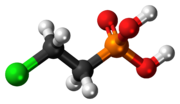|
Ethephon
Ethephon is a plant growth regulator.[1] Mechanism of actionUpon metabolism by the plant, it is converted into ethylene, a potent regulator of plant growth and ripeness. When applied in a plant which is in a vegetative stage, ethylene usually acts by hindering vegetative growth and inducing the start of the flowering stage. If applied in a later stage, it can make the ripening of some fruits quicker. It is also a butyrylcholinesterase inhibitor.[2] Uses in various crops Ethephon is often used on wheat, coffee, tobacco, cotton, and rice in order to help the plant's fruit reach ripeness more quickly. Cotton is the most important single crop use for ethephon. It initiates fruiting over a period of several weeks, promotes early concentrated boll opening, and enhances defoliation to facilitate and improve the efficiency of scheduled harvesting. Harvested cotton quality is improved.[3][4] Ethephon is also widely used by pineapple growers to initiate the fruit's reproductive development (forcing). Ethephon is also sprayed on mature-green pineapple fruits to degreen them to meet produce marketing requirements. There can be some detrimental effect on fruit quality.[citation needed] It is sometimes used by cannabis growers to induce flowering, abort seed formation, increase the quality of the resins, induce the appearance of female flowers in male plants, and to suppress the development of male flowers in hermaphrodite plants.[5] The toxicity of ethephon is very low,[6] and any ethephon used on the plant is converted very quickly to ethylene.[7] The use of this chemical is allowed in the European Union. References
|
||||||||||||||||||||||||||||||||||||||||||||||||||||||
Portal di Ensiklopedia Dunia

